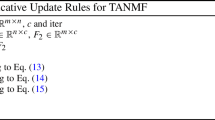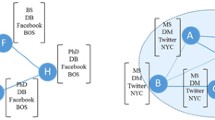Abstract
Community detection is widely used in network analysis, which seeks to divide network nodes into distinct communities based on the topology structure and attribute information of the network. Due to its interpretability, nonnegative matrix factorization becomes an essential method for community detection. However, it decomposes the adjacency matrix and attribute matrix separately, which do not tightly incorporate topology and attributes. And in the problem of division inconsistency based on topology and attributes caused by the mismatch between the topology similarity and attribute similarity of paired nodes, it ignores the difference in the matching degree of each attribute and each node. In this paper, we propose a nonnegative matrix factorization algorithm for community detection (MTACD) based on the matching degree between topology and attribute. First, we employ an attribute embedding mechanism to enhance the node-attribute relationship. Second, we design an attribute matching degree and a node topology-and-attribute matching degree in order to resolve the mismatch between topology and attribute similarity. Experiments on both real-world and synthetic networks demonstrate the effectiveness of our algorithm.
Access this chapter
Tax calculation will be finalised at checkout
Purchases are for personal use only
Similar content being viewed by others
References
Wang, Y., Zhang, Y.: Nonnegative matrix factorization: a comprehensive review. IEEE Trans. Knowl. Data Eng. 25(6), 1336–1353 (2012)
Seung, D., Lee, L.: Algorithms for non-negative matrix factorization. Adv. Neural. Inf. Process. Syst. 13, 556–562 (2001)
Yang, C., Liu, Z., Zhao, D., Sun, M., Chang, E.: Network representation learning with rich text information. In: Proceedings of the 24th International Conference on Artificial Intelligence, pp. 2111–2117 (2015)
Huang, X., Li, J., Hu, X.: Accelerated attributed network embedding. In: Proceedings of the 2017 SIAM International Conference on Data Mining (SDM), pp. 633–641 (2017)
Qiu, J., Dong, Y., Ma, H., Li, J., Wang, K., Tang, J.: Network embedding as matrix factorization: unifying DeepWalk, LINE, PTE, and Node2vec. In: Proceedings of the 11th ACM International Conference on Web Search and Data Mining, pp. 459–467 (2018)
Perozzi, B., Al-Rfou, R., Skiena, S.: DeepWalk: online learning of social representations. In: Proceedings of the 20th ACM SIGKDD International Conference on Knowledge Discovery and Data Mining, pp. 701–710 (2014)
Tang, J., Qu, M., Wang, M., Zhang, M., Yan, J., Mei, Q.: Line: large-scale information network embedding. In: Proceedings of the 24th International Conference on World Wide Web, pp. 1067–1077 (2015)
Grover, A., Leskovec, J.: node2vec: scalable feature learning for networks. In: Proceedings of the 22nd ACM SIGKDD International Conference on Knowledge Discovery and Data Mining, pp. 855–864 (2016)
Wang, X., Cui, P., Wang, J., Pei, J., Zhu, W., Yang, S.: Community preserving network embedding. In: Proceedings of the AAAI Conference on Artificial Intelligence, vol. 31 (2017)
Ye, F., Chen, C., Zheng, Z.: Deep autoencoder-like nonnegative matrix factorization for community detection. In: Proceedings of the 27th ACM International Conference on Information and Knowledge Management, pp. 1393–1402 (2018)
Wang, X., **, D., Cao, X., Yang L., Zhang, W.: Semantic community identification in large attribute networks. In: Proceedings of the AAAI Conference on Artificial Intelligence, vol. 30 (2016)
Li, Y., Sha, C., Huang, X., Zhang, Y.: Community detection in attributed graphs: an embedding approach. In: Proceedings of the AAAI Conference on Artificial Intelligence, vol. 32 (2018)
Qin, M., **, D., He D, Gabrys, B., Musial, K.: Adaptive community detection incorporating topology and content in social networks. In: Proceedings of the 2017 IEEE/ACM International Conference on Advances in Social Networks Analysis and Mining 2017, pp. 675–682 (2017)
Zhao, Z., Ke, Z., Gou, Z., Guo, H., Jiang, K., Zhang, R.: The trade-off between topology and content in community detection: an adaptive encoder-decoder-based NMF approach. Expert Syst. Appl. 209, 118230 (2022)
Meng, Q., Kai, L.: Dual-channel hybrid community detection in attributed networks. Inf. Sci. 551, 146–167 (2021)
Newman, M.E.J.: Mixing patterns in networks. Phys. Rev. E 67(2), 026126 (2003)
Newman, M.E.J., Girvan, M.: Finding and evaluating community structure in networks. Phys. Rev. E 69(2), 026113 (2004)
Lancichinetti, A., Fortunato, S., Radicchi, F.: Benchmark graphs for testing community detection algorithms. Phys. Rev. E 78(4), 046110 (2008)
Huang, B., Wang, C., Wang, B.: NMLPA: uncovering overlap** communities in attributed networks via a multi-label propagation approach. Sensors 19(2), 260 (2019)
Chakraborty, T., Dalmia, A., Mukherjee, A., Ganguly, N.: Metrics for community analysis: a survey. ACM Comput. Surv. (CSUR) 50(4), 1–37 (2017)
Acknowledgements
This work was supported by the National Natural Science Foundation of China under Grant No. 62002063 and No. U21A20472, the National Key Research and Development Plan of China under Grant No. 2021YFB3600503, the Fujian Collaborative Innovation Center for Big Data Applications in Governments, the Fujian Industry-Academy Cooperation Project under Grant No. 2017H6008 and No. 2018H6010, the Natural Science Foundation of Fujian Province under Grant No. 2022J01118, No. 2020J05112 and No. 2020J01420, the Fujian Provincial Department of Education under Grant No. JAT190026, the Major Science and Technology Project of Fujian Province under Grant No. 2021HZ022007 and Haixi Government Big Data Application Cooperative Innovation Center.
Author information
Authors and Affiliations
Corresponding author
Editor information
Editors and Affiliations
Rights and permissions
Copyright information
© 2024 The Author(s), under exclusive license to Springer Nature Singapore Pte Ltd.
About this paper
Cite this paper
Zeng, R., Liu, Z., Guo, K. (2024). Nonnegative Matrix Factorization Based on Topology-and-Attribute-Matching Degree for Community Detection. In: Sun, Y., Lu, T., Wang, T., Fan, H., Liu, D., Du, B. (eds) Computer Supported Cooperative Work and Social Computing. ChineseCSCW 2023. Communications in Computer and Information Science, vol 2012. Springer, Singapore. https://doi.org/10.1007/978-981-99-9637-7_10
Download citation
DOI: https://doi.org/10.1007/978-981-99-9637-7_10
Published:
Publisher Name: Springer, Singapore
Print ISBN: 978-981-99-9636-0
Online ISBN: 978-981-99-9637-7
eBook Packages: Computer ScienceComputer Science (R0)





